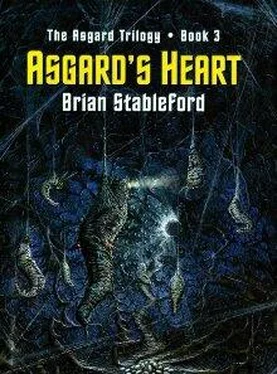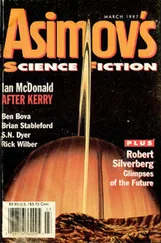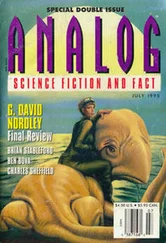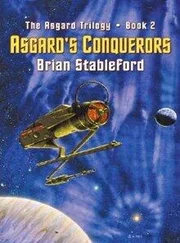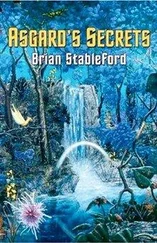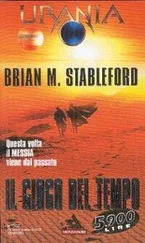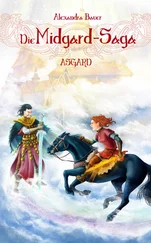When the platform stopped, having reached the bottom of its shaft, I switched the truck’s lights full on, and Urania promptly bent over her sister the suitcase. She wasn’t controlling her—she was merely making ready to relay to us any messages or commands which Clio wanted passed on. I was sitting in front of the manual controls, ready to grab them if the circumstances should make it necessary, but I knew that no such situation was likely to arise and I felt uncomfortably impotent. I even envied Susarma Lear her control of the guns.
There was no time to think too hard about it, though, because the moment the platform ceased its descent our sacrificial army of tin gladiators was scattering into every space they could find, and the explosions were already beginning: one, two, three.
We could hear the blasts and see the splashes of fire, but they were not so very close at hand—the jury-rigged soldiers whose job it was to get in the way were playing hero and victim to the very best of their ability. I only hoped that those which had some elementary capacity for fighting back were sending forth their own missiles to wreak a measure of havoc among the enemy. Some pretty heavy stuff must have been fired at us, because we rocked slightly as we got underway, but we sustained no damage.
Susarma began returning fire as soon as she had space to fire at the bad guys without hitting our own troops. She sent streams of flame-bolts out in two directions. The flame-bolts, which became gaseous almost instantly once they were in flight, were much more difficult to stop than the solid missiles which were fired at us; although they couldn’t penetrate armour as heavy as the stuff which was wrapped around us, they could do a lot of damage to anything that was slightly less robust—including the gun-barrels and firing mechanisms of the robots arrayed against us. Clio was firing too—she still had control of the magic bazookas: the software disrupters.
It would have been nice to know what kind of carnage we were creating in the enemy ranks, but I couldn’t see a damn thing through the flickering glare except for a few shards from the bodies of our defenders which impacted with the bar of clear plastic which served as a window.
The truck was accelerating as fast as it could, and the momentum threw me backwards. The doorway through which we passed wasn’t very tall or wide, and there was something in the open space beyond it which had fired at least one of the three biggest missiles which had come at us, but the only thing we could do was go like hell and try to break through the ambush.
I presumed that Clio was able to send signals of some kind to the suicide squadron, trying to make sure that they all got blown to bits usefully, but there was no way I could keep track of what was happening. I just held on tight while we rocketed away from the shaft, hoping that Susarma and the suitcase were equal to their task.
We had to swerve round something big and solid, and then had to run a gauntlet of things which came from either side, determined to blow us away if they could. A couple were essentially similar in design to the mantis which had chased me in the garden, while others were just cannons on legs, but as each one came up something zapped it—if none of our fast-diminishing army of supporters got it, Susarma or Clio did. These things were obviously operating a long way from home: they were geared to travel as well as to fight, and their firepower was correspondingly modest.
There was a sudden series of explosions in front of the truck, as the road seemed to rise up to attack us with tongues of flame. I winced, realising that it had been mined with explosive charges which could throw us up in the air and turn us over even if they couldn’t crack our underbelly—but the suitcase had detected them early enough, and every one of them was exploding prematurely.
The battle lasted about two minutes and fifteen seconds, and when it ended our robot transporter was hurtling into the darkness at a hundred kilometres an hour, its steely carapace whole and essentially undamaged. The sound and the fury faded behind us, our automata and theirs still exchanging whatever shots they could. I think the battle continued, sporadically, for a few more minutes when we were out of it, as the two companies of machines made what efforts they could to mop up. There was no way to know how many survivors there might be, and whether any of them might be ours. We didn’t intend that any pursuers should ever catch up with us.
The lights of the truck were now the only source of illumination in the neighbourhood. They showed us the way ahead clearly enough—in fact, I could see the tracks which the other truck had left in the soft earth. It was more difficult to see what lay to either side of the road, but we were out in the open, although we frequently passed hugely thick pillars connecting the floor to the ceiling. This had once been some kind of forest, but it had obviously been dead long before the lights were switched out. The trees were leafless, most of the branches broken away to leave the jagged boles jutting like rotten teeth. They showed up grey in the light, and gave the impression of being petrified, yet somehow still brittle.
Nothing moved. Even the dust kicked up by the truck we were chasing had settled back to the ground.
“Have the Nine explored this level?” asked Myrlin. “Do they know what happened here?”
“Our machines have been here,” Urania replied, with a slight uncharacteristic hoarseness in her voice that suggested that the experience of conflict had not left her unaffected. “They found little here to interest us, and we already had a way down into lower levels than this one, so we made no attempt to search vigorously for new routes. We are not sure what manner of disaster destroyed the life-system.”
“Could it be that the trees are simply the last evidential remains of an ecocatastrophe?” asked Myrlin, whose own voice was not completely steady. “It might have been something initially trivial—closed ecospheres must always be vulnerable to mutant viruses which break crucial food-chains by wiping out the members of a particular group of species.”
“It is unlikely,” said Urania, soberly. “The extending consequences of such an event might easily be disastrous for higher species, but it is difficult to believe that it could exterminate all life. It seems more probable that this habitat was deliberately sterilised.”
“An act of war?” I ventured, knowing that she wouldn’t be able to answer. If she had, she’d have told us already.
“Not necessarily,” she replied with all due caution.
“How many levels further down did your explorer robots manage to penetrate?” I asked.
“The lowest level we have attained is one hundred and three below this one, although we did not gain access to all the intermediate ones.”
“Any more dead ones?”
“Only one,” she said. “But seven of the habitats have reducing atmospheres, and were difficult to explore. A further ten have ecosystems which are entirely thermosynthetic, and six of those are entirely dark, consisting of organisms which make no use of bioluminescence at all.”
“How many of the remainder have indigenous humanoid life?”
“Four of the seventy-one about which we have information,” she said. “We have not attempted to communicate with any of them, but have been content to observe. None of the four seemed aware of the fact that there are habitats other than their own; all were technologically primitive in our terms—even by galactic standards. Their use of the power available to them from the central network was very limited, although that will not insulate them from the ecocatastrophes which will occur as a result of the switching off of that power.”
Читать дальше
